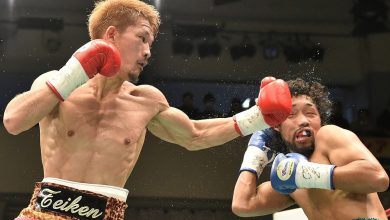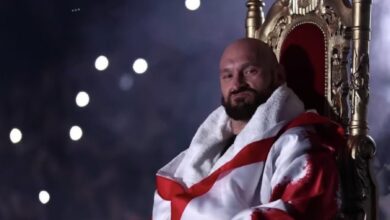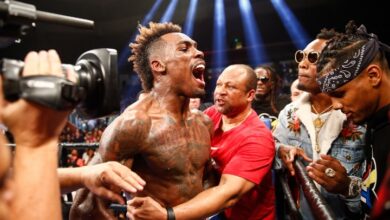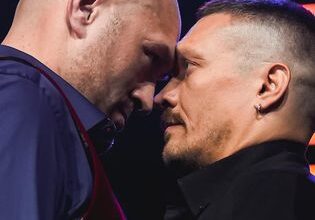The British Super-Featherweight Curse
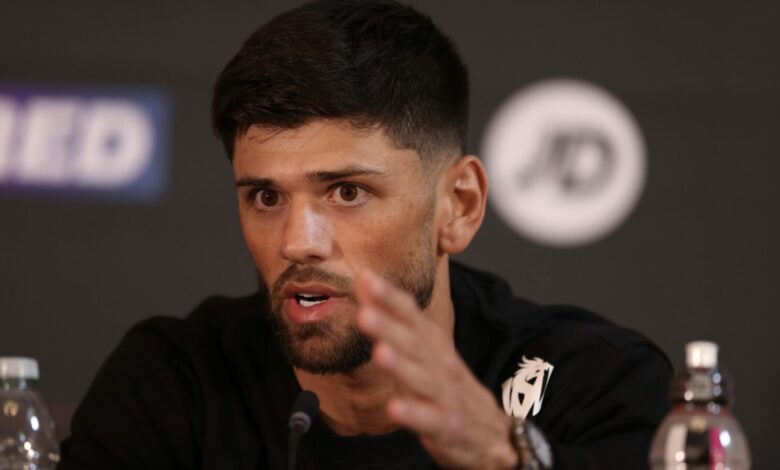
Tonight, Joe Cordina attempts to become the second member of 2016 Rio Olympic Team GB squad to capture a world title when he challenges Kenichi Ogawa for the IBF super featherweight strap.
Cordina (14-0, 8 KOs) is the bookmakers’ favourite (currently 4/7 with Betfred) and has the advantage of the fight taking place in his home city of Cardiff. Despite these factors in his favour, history is not on his side. Just 12 boxers from the United Kingdom have participated in world title fights in the 130lbs division. Of those, only four have become world champions, and three of those failed to make a single successful defence.
Can the ‘Welsh Wizard’ succeed where so many of his compatriots have failed?
Here are the men that walked the path before Cordina and how they fared:
Najib Daho (34-25-1, 11 KOs)
Born in Morrocco, Daho moved to Manchester, possibly, aged 15. It is hard to say exactly how old he was as the man himself had little idea. He required a date of birth, so he provided one – it just happened to be made up on the spot. He had his first professional fight at 17 (give or take) and lost three of his first four contests.
Daho’s route was not an easy one, he often took fights against bigger men, on short notice. A four-fight winning streak led to Daho challenging, 1976 Montreal Olympic bronze medallist, Pat Cowdell for the British super feather title. Daho produced a stunning upset, halting the champion in the first round. That victory earned Daho a shot at the IBF 130lbs strap. On August 23, 1986 Daho had his world title tilt as he challenged Barry Michael at Granada Studios,
Manchester. The pair had faced seven years previous, and Daho was victorious, over eight-rounds. The fight was unusual, not only due to a man born in Watford representing Australia defending his title against and English Berber, but because the sanctioning body (still in its infancy) was not yet recognised by the British Boxing Board of Control. A solution to politics was eventually reached between the BBBofC and the IBF.
Daho was unable to replicate the performance of their first encounter, as the Aussie was simply too strong and the champion retained his title by unanimous decision. Daho would go onto win the Commonwealth lightweight title, before finishing his career on the back of a three-fight losing streak, in 1991. Two years later, he lost his life as the result of a car accident in Morrocco, aged 34 (ish).
Jim McDonnell (26-4, 12 KOs)
McDonnell turned professional in 1983, having won the ABA title and a silver medal at the 1982 Commonwealth Games as an amateur. McDonnell balanced training with his day job as a caretaker for Camden Council. McDonnell appeared to balance his two careers without having a detrimental effect on his boxing as he won the European super featherweight title in 1986, defeating Salvatore Bottiglieri by unanimous decision on the undercard of Frank Bruno’s unsuccessful heavyweight world title challenge against Tim Witherspoon.
McDonnell would string together six more wins before landing a world title opportunity against Brian Mitchell, on November 02, 1988, with the WBA super featherweight title at stake. On the night, McDonnell produced a surprisingly subdued performance, losing by unanimous decision. Subsequently, it was revealed that Terry Lawless attempted to force McDonnell to sign a new contract as he was about to begin his ring walk.
There was an argument and threats, but the contract was not signed. Hardly ideal preparation for the biggest bout of your life. Two fights later, McDonnell secured the biggest win of his career, stopping Barry McGuigan in the fourth round. Victory earned ‘The Camden Caretaker’ a shot at WBC super featherweight champion, Azumah Nelson, on November 05, 1989.
McDonnell gave a better account of himself than he had done against Mitchell, but at the end of the 11th round, his eye was swollen shut. McDonnell could not see out of the injured eye, but he was allowed to continue. It was only a matter of time before the champion found the fight-ending shot. McDonnell would return at lightweight 10 months later, but suffered a disturbing knockout against Kenny Vice.
McDonnell would fight one more time in Kosice, Slovakia, almost eight years after his previous bout, losing to, journeyman, Peter Feher. McDonnell would go on to have a successful career as a trainer, leading James DeGale to the IBF super-middleweight world title.
Joey Jacobs (10-5, 2 KOs)
The Mancunian had a distinguished amateur career which saw him win the ABA lightweight title and capture a bronze medal at the Commonwealth Games, both in 1986. Jacobs turned professional that same year, but was never able to replicate the success he enjoyed in the unpaid ranks.
After winning his first five fights as a pro, he suffered a shock opening round defeat to George Baigrie, who had a record of 5-12-1 at the time. Just two fights later, Jacobs won the Central Area lightweight title, before unsuccessfully challenging Carl Cook for the British 135lbs strap. That defeat would convince Jacobs to drop down to super featherweight, where he captured the British title which had eluded him one division north, defeating John Doherty by a single point, at a time when title fights were solely scored by the referee.
The Manchester native’s first defence did not go well as he was stopped in the 11th round by Hugh Forde. Oddly, Jacobs’ reward in defeat was a shot at the WBO title held by Italy-based Moroccan, Kamel Bou-Ali, on June 01, 1991, in Sicilia, Italy. At the time, the Puerto Rican sanctioning body was in its formative years and lightly regarded by many in the sport, as such, Jacobs’ world title tilt received little coverage in the British media.
Perhaps for the best, as the Englishman was dropped in both the second and third round, obliging his trainer to throw in the towel after the second knockdown. It would be Jacobs last fight. If you asked 100 boxing fans to name every British fighter to have challenged for a world title, I’d be surprised if Jacobs featured on many, if any, lists.
Floyd Havard (34-2, 21 KOs)
The most pertinent cautionary tale on this list for Joe Cordina is, fellow Welshman, Havard. The parallels are easy to draw. Havard was a talented amateur who narrowly missed out on representing Great Britain at the 1984 Olympics. The Swansea fighter bounced back from that disappointment to capture the ABA featherweight title in 1985 and turned pro that same year. Within three years, Havard had amassed 18 wins and was yet to taste defeat.
He captured the British super featherweight title in his next bout, stopping, Olympic bronze medallist, Pat Cowdell in the eighth round. Havard lost the title in his first defence to John Doherty, when the Welshman retired from the contest in the 11th round with an injured right hand.
Havard strung together four wins following the Doherty defeat and landed a shot at the IBF 130lbs title, held by John John Molina. Promoter Frank (now Kelli) Maloney secured home advantage for his fighter, staging the bout at the Welsh Institute of Sport, Cardiff, on January 22, 1994.
The fight could have taken place in Havard’s back garden with father refereeing and it would not have been enough to overturn the gulf in ability. Havard was on the canvass in third round, sustained a broken nose and had not won a round when his corner pulled him from the fight at the end of the sixth. Havard went on to have a second stint as British champion but never ventured close to world level again.
Barry Jones (18-1-1, 1 KO)
Let me preface this by stating that we here at Boxing Social are big fans of Barry Jones, but it’s ok, you more than likely are too. Everyone loves Barry Jones. However, I will attempt to be as objective as possible. Jones enjoyed a successful amateur career as a youth, winning silver at the European Junior Championships, in 1992. The Welshman turned professional at 18 and had his first four fights in leisure centres. However, his fifth bout would take place on the undercard of the rematch between Chris Eubank and Nigel Benn, at Old Trafford Stadium, Manchester.
Despite his lack of power, Jones was well-schooled under the tutelage of Pat Thomas, and would usually box his way to a comfortable points victory. His promoter, Frank Warren, secured the Welshman a shot at the vacant WBO super featherweight title in 1997 – something which will become a recurring theme later in this list. On December 19, 1997, Jones outclassed, Colombian, Wilson Palacio to win the strap by unanimous decision, becoming the first fighter from the United Kingdom to win a world title at 130lbs.
The following year began with frustration and ended in heartbreak for Jones. The Welshman was set to earn a career-high payday against, Frenchman, Julien Lorcy, but the fight originally intended to take place in February was first rescheduled for April, then May. The bout ultimately fell through when an abnormality on Jones’ brain scan resulted in the British Boxing Board of Control taking away his license to box, which led to the WBO stripping him of the title.
After seven months of expert opinion and debate, the BBBofC reinstated Jones’ license. Unfortunately, during Jones’ enforced absence, the WBO had moved on and had a new champion – Acelino Freitas. The sanctioning body ensured Jones was given the opportunity to regain his title against the Brazilian who was 23-0 and with 23-0 knockouts.

Jones was intended to be the 24th victim, but the man from Ely had not read the script, sending the champion to the canvass in the opening round. That appeared to enrage the Brazilian who went on to halt Jones in the eighth round. It would be Jones’ final fight.
Alex Arthur (31-3, 21 KOs)
The Scotsman is the first fighter on the list to have earned his world title the “traditional” way having first won British, Commonwealth and European honours. Arthur captured the British super featherweight strap in just his 13th fight. He would follow that victory up with defences against Carl Greaves and Willie Limond, halting them in the sixth and eighth rounds, respectively.
Affable, with a crowd-pleasing style and the punch to end a contest, ‘AAA’ was on the rise and tipped to be the next big thing in Scottish boxing. That trajectory was altered somewhat during Arthur’s third defence against Michael Gomez. The ‘Mancunian Mexican’ was an enigmatic character, capable of being a well-schooled force of destruction or uninterested and lacklustre.
On that night in Edinburgh, a version of Gomez that had not been seen before, or since, turned up, sending the Scot to the canvass on three occasions. Arthur played his part in one the best fights seen in a British ring, but was unable to handle his opponent’s power or accuracy on the night. Arthur would recover from defeat and go onto with British, Commonwealth and European titles, defeating, future three-weight world champion, Ricky Burns in the process.
Arthur’s attempts to land an all-Scottish bout with Scott Harrison failed to come to fruition, but he did secure a shot at the Interim WBO super featherweight strap against, former Olympian, Koba Gogoladze. Arthur produced the performance of his life, dropping the Georgian three times before obliging the referee to halt the contest in the 10th round. Arthur defended his strap with a unanimous decision over Stephen Foster Jr. five months later.
The Interim belt made the Edinburgh man the mandatory challenger for the full title, which was in the possession of Joan Guzman. A fight between Arthur and the Dominican had been scheduled for May 2008, but was cancelled after the champion had visa issues which prevented him from entering Scotland in time. Guzman ultimately opted to move up to lightweight and as such, Arthur was upgrade to full champion status.
The politics which had delayed Arthur his defining fight were costly. By the time Arthur made the first defence of title against Nicky Cook, his battle with the scales, which had always been arduous, became untenable. Arthur was barely eating in the run up to the bout, and after making weight, became ill. Arthur’s issues with the weight cut were evident as he turned in a flat performance to lose his title by unanimous decision. The only British world champion to have never won a world title fight.
Nicky Cook (30-3, 16 KOs)
Like Arthur before him, Nicky Cook captured the British, Commonwealth and European titles (at featherweight), and despite winning a world title, the prevailing feeling is he could have achieved more, had circumstances been different. Having proved himself at continental level, ‘Cookie’ was handed the chance to test himself at world level against, WBO featherweight champion, Scott Harrison, in December 2006.
The troubled Scotsman had just completed his first stint in a Spanish jail as the result of a fracas over a taxi journey. Harrison was ultimately deemed unfit to participate in the bout and the opportunity was gone. Seven-months later, Cook contested the belt vacated by Harrison, but was stopped by Steve Leuvano in the 11th round, with the American leading on all three scorecards.
A move to 130lbs brought success as Cook outpointed Arthur to become a world champion, but his reign was short-lived. Cook was ordered to defend his belt against mandatory challenger, Roman ‘Rocky’ Martinez. The undefeated Puerto Rican puncher stopped the champion in the fourth round. The latter portion of the Dagenham man’s career was plagued by back injuries. He was given the opportunity to regain the title he once held with a shot at then-champion, Ricky Burns. However, a prolapsed discs resulted in a first round TKO victory for the Scot. Cook did not fight again.
Ricky Burns (44-8-1, 16 KOs)
The most recent, and most unlikely, British fighter to win a super-featherweight world title. Ricky Burns has developed a habit of upsetting the odds over the years, firstly defeating British lightweight champion Graham Earl over eight-rounds in a non-title contest, in just his 10th fight. A year later, Burns’ attempts at repeating the trick were unsuccessful as he lost to Alex Arthur in a challenge for the British, Commonwealth and European 130lbs straps.
The Coatbridge fighter would get a second crack at the British title, but once again lost by unanimous decision to Carl Johanneson, having been dropped three times. Burns turned his fortunes around by claiming the vacant Commonwealth belt against Osumanu Akaba. His run as champion would be unremarkable, with his most noteworthy victory coming against, a faded, Michael Gomez.
Despite the moderate level of opposition he had faced, it was enough to secure a shot at the WBO super featherweight title, held by Roman Martinez, on September 04, 2010. Burns was given little hope, despite having the advantage of the fight taking place in Glasgow. The opening round appeared to confirm the most pessimistic of predictions as the challenger was knocked down heavily. Surprisingly, Burns rallied to win a close, but fair decision.
Frank Warren, having previously promoted three WBO super featherweight champions, all of which failed to make a single successful defence was determined that history would not repeat itself once more. As such, Burns’ title reign was perhaps one of the worst in recent memory. His maiden defence was against, the overmatched, Adreas Evensen. Next was Joseph Laryea who scuppered an all-Scottish showdown by upsetting Paul Appleby. Finally, Burns halted an injured Nicky Cook in the opening round. Burns went on to become Scotland’s first three-weight world champion.
Stephen Smith (28-4, 15 KOs)
One of British boxing’s nearly men. The Scouser twice gave a good account of himself at world level, but could not do enough to be successful. Having won bronze at the European Championships and gold at the Commonwealth Games, in 2006, hopes were high for ‘Swifty’ when he turned professional.
The early stages of Smith’s career in pro ranks went smoothly, amassing 10 wins in two years. In his 11th bout, Smith challenged John Simpson for the Commonwealth featherweight title, the fight was extremely close with the Scouser prevailing by split decision.
The pair would fight again the following year, this time with the British title at stake. Smith once again was deemed the victor, this time by majority decision. Smith suffered a shock defeat in his next fight, as he was stopped by Lee Selby. A perfectly timed uppercut saw Smith knockout Gary Buckland to win the British title at 130lbs.
Smith went five years unbeaten following the loss to Selby and earned the right to challenge Jose Pedraza for the IBF super featherweight title, on April 16, 2016. Smith was valiant, the champion was better. By the end of the year, ‘Swifty’ was handed a second opportunity to become a world champion when he faced Jose Sosa for the WBA “Regular” strap. Sosa was just too tough and refused to be denied, hardly surprising as he is from Camden, New Jersey (search it on Google Images). Smith would fight on for another three years, but a world title continued to elude him.
Liam Walsh (23-1, 15 KOs)
The definition of a good, honest professional. Walsh came to prominence during the first main event broadcast on BoxNation, as he and Paul Appleby produced a small-hall classic for the Commonwealth super featherweight belt. Walsh would later add the British title to his Commonwealth strap and faced solid domestic opposition in: Jon Kays, Scott Harrison, Joe Murray, Gary Sykes and Troy James.
Walsh secured a surprise world title shot against Ricky Burns for the WBO lightweight belt in 2012, but was forced to withdraw due to injury sustained during a car accident. Walsh would have to wait another five years to challenge for a world title, taking on Gervonta Davis on May 20, 2017.
The IBF super featherweight champion was deemed to be the next big thing and had the promotional backing of Floyd Mayweather. ‘Tank’ had looked sensational when stopping Jose Pedraza to capture the belt. However, some remained optimistic of Walsh’s changes, as Pedraza’s tactics were, well, non-existent. That hope was soon dashed. Davis halted Walsh in the third round. Walsh has not fought since defeating Maxi Hughes, in 2019.
James Tennyson (28-4, 24 KOs)
Vicious, but vulnerable. The Belfast banger is fantastic television fighter. You can almost guarantee someone is hitting the canvas. Tennyson had fallen short at domestic level when he was halted by Ryan Walsh with the British featherweight title at stake.
Tennyson had more success one division north, stopping: Declan Geraghty, Ryan Doyle, Darren Traynor and Martin Ward. The latter earned him the European and Commonwealth straps. A world title shot followed as he travelled to Boston, Massachusetts, to challenge Tevin Farmer on October 20, 2018.
The southpaw was too sick, too elusive and too good for the Belfast man, dropping the challenger in the fourth and again in the fifth with body shots, obliging the referee to halt the contest. Tennyson moved up to 135lbs and captured the British title before being stopped by Jovani Straffon for the IBO lightweight belt.
Carl Frampton (28-3, 16 KOs)
Frampton’s attempts to become the first three-weight world champion from the island of Ireland ended in heartbreak. However, at his peak, the Belfast man was one of the best British fighters of recent years. ‘The Jackal’ won the Commonwealth super bantamweight title in his 11th bout, stopping Mark Quon inside four rounds.
Five fights later, Frampton outlasted Kiko Martinez in a battle of attrition, halting the Spaniard in the ninth frame to win the European title at the same weight. Nineteen-months later, the pair would fight once more, this time with Martinez’s IBF super bantamweight world title at stake.
Frampton fought smarter second time around and won by unanimous decision. Frampton unified the IBF and WBA titles by defeating, domestic rival Scott Quigg. The Bury man oddly elected to be uncharacteristically defensive for the opening six rounds, by the time Quigg opted to go on the front foot, the fight had been lost.
Frampton then moved up in weight to capture the WBA “Super” featherweight title against Leo Santa Cruz, in Las Vegas. However, the Mexican recaptured his belt in the rematch and a trilogy bout never came to fruition. Frampton’s attempt at becoming a two-time featherweight world champion was unsuccessful as he endured a torrid opening six minutes against Josh Warrington.
Frampton gained a foothold in the fight, but it was not enough to claim the strap. On April 03, 2021, ‘The Jackal’ challenged Jamel Herring for the WBO super featherweight title. Frampton struggled with the naturally bigger man’s physical attributes and accuracy from the opening bell, and was down in the fifth and sixth rounds, with the bout being called off after the second knockdown. Frampton retired afterwards.
